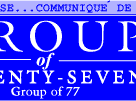



 |
 |
 |
 |
|
Ambassador Bagher Asadi (Islamic Republic of Iran), Chairman
|
|
FOR
IMMEDIATE WORLDWIDE RELEASE IN THE G-77 CHAPTERS:
GENEVA - NAIROBI - PARIS - VIENNA - WASHINGTON, D.C. |
Momentuous Meeting of Developing Nations in Tehran |
South-South Cooperation Toward a Global Economy |
|
Tehran, 19 August 2001 – A historic gathering of representatives from over a 100 delegations representing both governments and International Organizations commenced in Tehran today to discuss practical ways to strengthen the economic independence of the developing countries in a fast globalizing economy. Sponsored by the Group of Seventy-Seven, the tenth meeting of the Intergovernmental Follow-up and Coordination Committee on Economic Cooperation (IFCC-X) will continue until 23 August. The IFCC is a high level forum that monitors and reviews the actions by member countries in the field of South-South Cooperation. The Committee was established in line with the provisions of the Caracas Program of Action that was adopted by the G-77 in 1981. In his opening message to the conference, President of the Islamic Republic of Iran, H.E. Seyed Mohammad Khatami, described IFCC-X as “a very important occasion for the assessment of what had been undertaken” prior to the South Summit that was held in Havana in April 2000. He added that the meeting “would provide the Group of 77 and China with a propitious opportunity to look into the state of economic cooperation among ourselves, and take a realistic stock of what has been achieved.” President Khatami underlined that South-South cooperation “is becoming all the more important in this tumultuous world,” adding that 20 years after the Caracas meeting, “we in the South do indeed enjoy the capacity and capability, as well as the collective experience, to face the challenges in front of us and address them.” He added that the G-77, as the “sole universal negotiating body of the developing world in the multilateral arena, has proved itself as a potent negotiating partner.” The president then described development as the “best contribution to peace.” Genuine, long-term and comprehensive development, he added, “cannot but start in our midst, by ourselves in our respective societies, and through our collective efforts – first and foremost, South-South cooperation. “We can, thorough joint
efforts, make the Tehran meeting a success and take a step toward the
state of economic cooperation among ourselves,” added the president.
“Let us try to put South-South cooperation on a new course. The message
from Tehran should be a message of resolve, creativity and hope.”
Also speaking at the opening ceremony was Mr. Jacques Diouf, Director-General of the UN Food and Agriculture Organization, who called South-South cooperation a fundamental and integral part of his agency´s efforts to assist the rural poor. Other speakers included the Director General of the UN Industrial Development Organization, Deputy Secretary General of UNCTAD, the Deputy Executive Director of UNEP and the Director-General of the OPEC Fund for International Development, who renewed their support and commitment to the G-77 and to fostering South-South cooperation. A joint G-77/UNDP award was then presented to the Italy-based Third World Academy of Science for its commitment to providing technical assistance to South-South initiatives. The Academy, founded in 1983 under the leadership of if the late Nobel Laureate Abdus Salam, has more than 2000 members from over eighty countries in the South. Its goal is to help build political and scientific leadership in the south for science-based economic development and promote sustainable development through South-South and South-North partnerships in science and technology. The Academy has played a key role in the establishment of the Third World Organization for Women in Science, which was launched in Cairo in 1993. The opening ceremony was followed by a high level ministerial interactive roundtable which was presided over by Ambassador Bagher Asadi, Chairman of the G-77 in New York. Interventions focused on five specific themes, including coordination between national and international economic policies; strengthening interregional commitments and building on regional and sub regional activities; social and political catalysts to South-South cooperation; defining partners for South-South cooperation; and institutional foundations for advancing such cooperation. The Group of Seventy-Seven represents 133 countries, including China, and is the largest coalition of developing countries in the world. ------ |
|
Office
of the Chairman of the Group of 77
|
|
Room
S-3959, United Nations Secretariat, New York, NY 10017, USA
|
|
Phone:
(212) 963-4777/3816 | Fax: (212) 963-3515 | Email: g77off@unmail.org
|
|
All
press communiques are available online at: www.g77.org
|